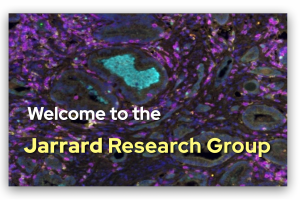
The Jarrard laboratory is focused on understanding and exploiting epigenetic mechanisms to understand prostate cancer development and treatment resistance.
We integrate clinical observations on prostate cancer with molecular epigenomics to understand why prostate cancer develops and how to better exploit treatment opportunities that arise after androgen deprivation therapy.
Our mission is to make discoveries that will improve the way we diagnose, prevent and treat prostate cancer.
